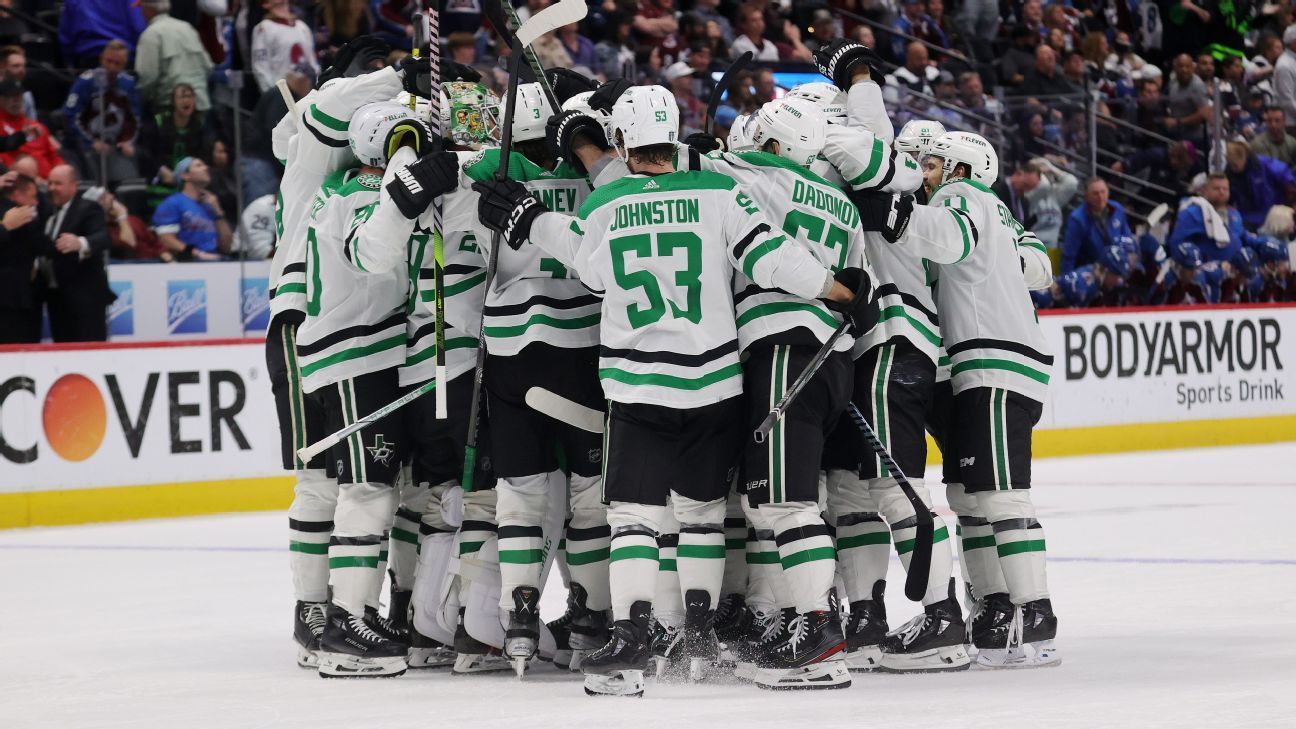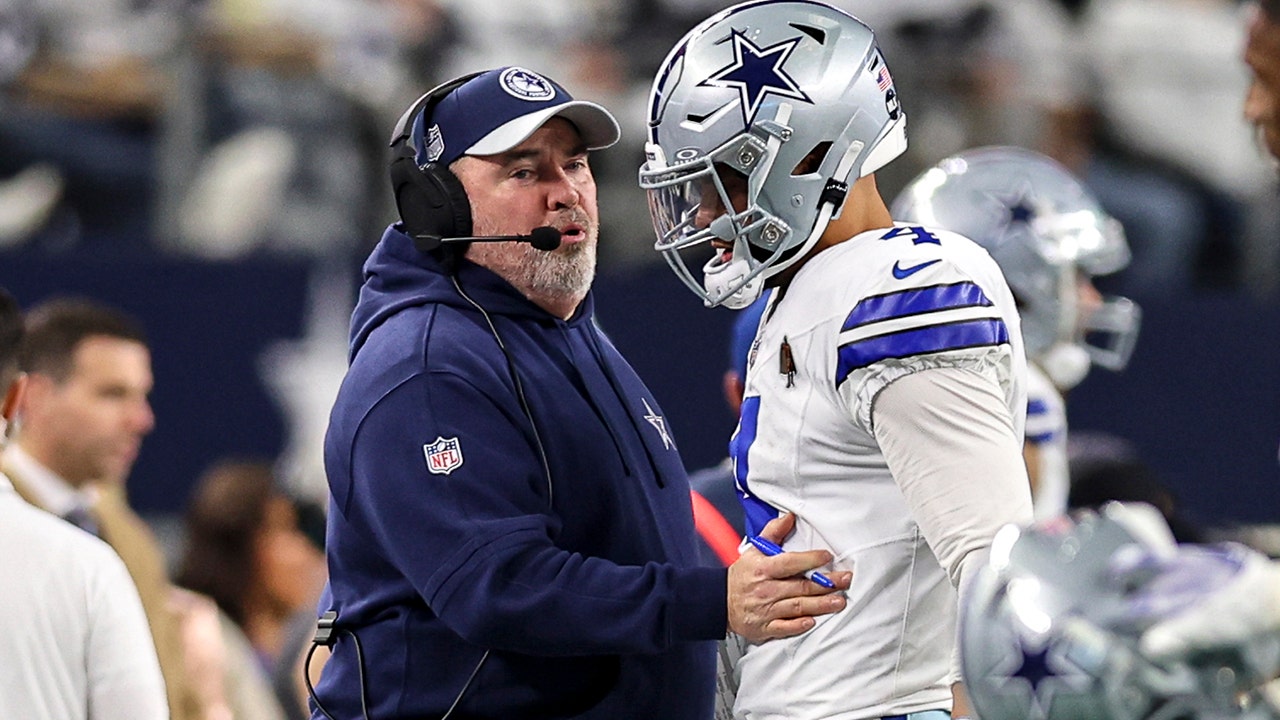The Dallas Stars beat the Colorado Avalanche in double overtime to advance to the Western Conference finals.
Dallas' next opponent will be the winner of the Vancouver Canucks-Edmonton Oilers series, which Vancouver leads 3-2.
Here's a look at how the Stars got here and how they compare to Vancouver or Edmonton.

Going from the field to the table has allowed the Stars to eat this postseason
Executives are always discussing the importance of trying to build a team through the draft and develop the kind of talent that can one day sustain a franchise. The Stars have done just that recently, and this postseason has shown the value of taking that approach.
How beneficial exactly has the Stars model been? Eleven of the 21 players who have played at least four games for the club were selected by the Stars. That's tied with the Bruins for the most local players to play in at least one playoff game this postseason. Their top three scoring leaders this postseason are homegrown talents (Miro Heiskanen, Wyatt Johnston and Jason Robertson), while four of their top five scorers were draft picks. for the club.
The same goes for the three players (Heiskanen, Thomas Harley and Esa Lindell) who lead them in average ice time. In fact, five of the six players who led the Stars in ice time during this playoff run were drafted by the team, the only exception being trade deadline acquisition Chris Tanev, who is fourth in minutes per game .
And then there's goaltender Jake Oettinger whose performances have seen him post a 2.27 goals-against average and a .914 save percentage this postseason. Yes, there are key contributors who came through free agency and trade, but this is a remarkably homegrown team.
The young star that continues to shine
When Johnston scored 24 goals and 41 points as a rookie last season, it sparked belief that the Stars might have something special. What Johnston has done throughout the 2023-24 season has further cemented that notion.
He scored 32 goals and 65 points in the regular season while averaging 17 minutes per game and played all 82. Then came the Stanley Cup playoffs, which allowed Johnston to take on an even bigger role as the Stars have reached the Western Conference finals for the second consecutive season.
Johnston has led the Stars with a team-high seven goals, while his 11 points are third on the team. His average ice time of 20:10 is the best among Stars forwards and fifth on the team overall. In fact, he was the only Stars forward to average more than 20 minutes per game in the playoffs, with the next closest being Robertson at 19:05.
0:51
Wyatt Johnston finds the back of the net for the second time.
Wyatt Johnston scores his second goal of the night to increase the Stars' lead over the Avalanche.
Even when they have lost, they have still made gains.
There is enough information to suggest that the Stars have had arguably the toughest road of any team reaching the conference final round this season.
It started when they beat the defending Stanley Cup champion Vegas Golden Knights in the first round before beating the 2022 champions Avalanche in Round 2. Facing the two most recent Cup champions allowed the Stars to show his ability to return to the series. They initially opened the first round in an 0-2 series hole against the Golden Knights only to come back and win four of the next five games. Keep in mind that the Stars had lost their last six against the Golden Knights and nine of their last 11 before beating them in Game 3.
As for the Avalanche, the Stars saw a three-goal lead in Game 1 disappear and the Avs won in overtime. Since then, the Stars fended off a late attempt by the Avs to win Game 2, being patient during what was an offensive blitz in Game 3 before orchestrating one of their strongest offensive performances in Game 4. And after a loss in Game 5 to potentially close things out. Coming out early, they rallied to seal the deal in Game 6.
This shows the strength of Dallas' system and their faith in it even when the results of the games are not as desired.
A not-so-false sense of security
Let's just say another hallmark of the Stars' success is their ability to act like the proverbial possum.
Perhaps the strangest detail about this iteration of the Stars' ascension is their struggles in Game 1. Not only did they lose their respective Game 1s to the Golden Knights and Avalanche, but the Stars lost six consecutive game 1s like an everything. That being said, they have won three of their last four series despite getting off to a slow start.
And if that wasn't enough, how about having Peter DeBoer behind the bench, who is now 8-0 all-time in Game 7s, tied with Darryl Sutter for most Game 7 wins by part of a coach in NHL history?
![]()
Regular season record vs. EDM: 2-0-1
Anyone who has ever wanted to see the hopes and dreams of a penalty die need only look at the Oilers' power play this postseason. They lead the playoffs with a 46.7% success rate. Possessing one of the most formidable power plays in the NHL is one of the reasons the Oilers are within striking distance of a second conference finals appearance in three years. Short-circuiting that power play is critical if this is Dallas' matchup.
There's a chance the Stars have solutions on how to deal with the Oilers for the advantage of extra skaters. The first step in that plan is something that has served the Stars well this postseason: They don't take many penalties. Entering Game 6, the Stars were the least penalized team of all the teams that made it to the second round, with just 66 penalty minutes. The next closest team was the Avalanche at 79 minutes.
Overall, the Stars' penalty kill is running at 72.0%, which is worst among active teams. But what could help them against the Oilers is if they could find a way to replicate the success they had against the Avalanche power play in Game 5. The Avs' power play operated with a 37.5% success rate in the first round against Winnipeg. Jets. In the first game, the Avs scored two power-play goals in their dramatic 4-3 comeback in overtime. But then they went on a scoreless streak in eight power-play opportunities against the Stars.
And of course, having a goalie of Oettinger's caliber helps on any penalty kill.
![]()
Regular season record vs. NPV: 2-1-0
The Stars average exactly 3.00 goals per game, while the Canucks average 2.73 per game, the second-lowest of the teams still in the playoffs. Those numbers help reinforce the idea that the team that can be the first to score three goals or the one that can score three goals consistently could have the advantage.
This is why. Finding and continuing to trust the connection between their five-man defensive structure and goaltenders is how the Canucks and Stars have found success this postseason. Of the teams still alive before Friday night, the Stars have allowed the second-fewest goals per game (2.50), while the Canucks have allowed the third-fewest (2.55).
And the other detail to consider is that both teams feel quite comfortable playing in close games. The Stars are 4-2 this postseason in one-goal games, although their victories in Games 2, 3 and 4 against the Avalanche saw them win by an average margin of three goals. As for the Canucks, all but two of their playoff games were decided by a single goal, both in the first two games of their series against the Nashville Predators.












